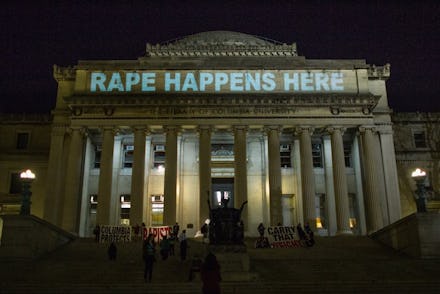Columbia Protestors Send a Powerful Message to Prospective Students

Prospective Columbia University students were confronted by a powerful message on Sunday in New York, when activists projected the words "Rape Happens Here" onto the side of the Low Memorial Library during a weekend dedicated to welcoming potential incoming students.
Members of Columbia's campus activism group No Red Tape teamed up with the Illuminator to project those words, along with "We Deserve a Safe Campus" and "Columbia Protects Rapists," on the building. Group members also stood in front of the library holding banners with similarly striking messages.
Activists staged the installation to address what they believe to be a lackluster administrative response to campus sexual assault.
"When prospective students come to the university, the administration likes to portray a certain image of itself, and we feel it's important that prospective students get the whole story and know the multiple ways in which the university is failing to keep students safe," Amber Officer-Narvasa, a member of No Red Tape Columbia, told Mic.
The protest, however, was disrupted within minutes, and according to Officer-Narvasa, a university employee attempted to obstruct the projection. Public safety officers followed the activists during the event, attempting to block their movements, and asked members of the group for information without properly identifying themselves, according to Officer-Narvasa.
Earlier on Sunday, No Red Tape activists also interrupted a family information session for admitted students, to shed light on the reality of assault on Columbia's campus. The group carried out a similar action earlier this year at prospective student information sessions, for which multiple activists involved received letters from university administrators informing them that they violated the "Rules of University Conduct." The letters described their interruption as failing to balance "the concurrent rights of both the university community as a whole and demonstrators."
The student-activists told Mic they're targeting Columbia's gender-based misconduct policy, which they say is unfair to survivors and also retraumatizes them. The current policy, they said, most commonly punishes alleged rapists and abusers with a mere one-semester suspension. Those students then return to campus uneducated about the consequences of their actions and are often reinstated to positions of power, such as orientation leaders and resident advisers.
Furthermore, the activists said, deans without proper training in the area of sexual violence are given the power to determine the outcome of these cases, and survivors are denied adequate resources or support systems.
Columbia University, which has yet to respond to Mic's request for comment, has responded to activist efforts in the past by implementing a "Sexual Respect" requirement. According to Columbia's website, this program requires students to better understand sexual respect and consent through "workshops, trainings, film screenings with discussion, videos and reflections, an arts option and keys to resiliency." Activists say, however, that this attempt to meet their demands for comprehensive consent education is lacking.
"In practice, the options provided for students were deeply inadequate and often ignored all empirical research about effective prevention programming," Sejal Singh, co-founder and core organizer of the Columbia University anti-sexual violence advocacy group, Coalition Against Sexual Violence, told Mic.
The recent efforts add to the organization Carrying the Weight Together's National Day of Action on Monday, which encourages students across the country to engage in anti-sexual assault protests on campus.
"We need to improve the sexual violence policies at Columbia and at every college and university now, so that no other student ever has to go through the pain I experienced after being assaulted on campus my freshman year," Zoe Ridolfi-Starr, a senior at Columbia University and a co-founder of the #CarryThatWeight campaign, told Mic. "We have more power when we fight together."